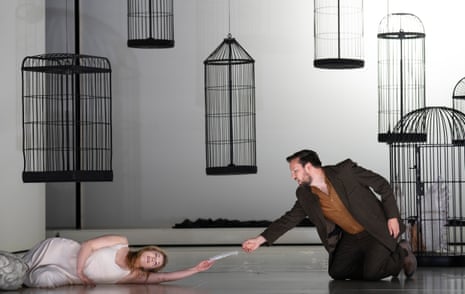Swirling currents of infidelity, hypocrisy and suicide meet in tragic confluence in Janáček’s Káťa Kabanová (1921). For its first new production of the season, Glyndebourne has turned this darkest of operas into a dazzle of white light and painful lucidity. Negating literal details of Czech village, church, countryside, the director Damiano Michieletto and designer Paolo Fantin have laid bare Káťa’s troubled mental state and translated brutal action into metaphor.
The set looks airy and minimal, Káťa’s sense of imprisonment and desire for freedom achieved by Alessandro Carletti’s intense use of lighting and high white walls that shut out the world. Three standard visual motifs, drawn from references in the libretto, are brought into play: bird, cage and angel. Magritte’s disturbing birdcage paintings, one of which he pointedly called The Therapist, come to mind. By the end, these symbols have multiplied to the point of distraction. This might irritate more had musical standards not been so outstanding in every quarter, steered by Glyndebourne’s music director, Robin Ticciati.
The central quartet, capturing Janáček’s distinctive speech melodies, interacted with characterful assurance: the soprano Kateřina Kněžíková, ablaze with musical intelligence in the title role, teetered between fragility, recklessness and strength; tenor Nicky Spence, ideally suited vocally to this high-lying repertoire, elicited sympathy as well as disgust as her downtrodden, drunken husband, Tichon. As her lover, Boris, David Butt Philip, in sterling voice, managed to be attractive, hubristic and feckless – no easy combination.
At the centre is Káťa’s mother-in-law, Kabanicha, ever the oppressive puppeteer. The mezzo-soprano Katarina Dalayman mesmerised: harsh, sanctimonious and, as the action reveals, phoney. Aigul Akhmetshina as Varvara and Thomas Atkins as the schoolteacher, Kudrjaš, made a fetching couple, leading a worthy supporting cast and chorus.
In Tony Burke’s reduced orchestration, the score had an extra sense of space and luminosity. Whether in noisy brass volleys or limpid harp passages, or anywhere between these extremes, the London Philharmonic Orchestra played with incision and passion. This 2021 festival is dedicated to Mary Christie, for six decades, until her death last year, the gracious chatelaine of Glyndebourne. Her menfolk – father-in-law John Christie, husband George and now son Gus – may have been official figureheads in this family affair. She was the welcoming spirit, and far more than that.
The other new productions this season are a comedy and a tragedy, Rossini’s Il turco in Italia and Verdi’s Luisa Miller. For the first time, Ticciati has also programmed four concerts (available to watch on Marquee TV) in which the resident ensembles, the LPO and the Orchestra of the Age of Enlightenment, will play music from baroque to contemporary, in the lovely auditorium, complete with traditional long interval.
Now in its third year, the Ragged Music festival has already won a reputation for world-class chamber music. No place will ever quite challenge Wigmore Hall’s supremacy for this form of intimate music-making, least of all an unassuming canalside warehouse where Dr Barnardo set up a “ragged school” for London’s East End children in the 1870s. Yet many of today’s musicians are committed to finding less formal, alternative venues, whether this peeling schoolroom, or the brutalist car park used by Bold Tendencies in Peckham, to name only two London examples. Once travel opens up, we can try those further afield. Opera or symphonic music can go big, in arena or open-air venue, and reach new audiences. Chamber music has to find other ways.

In the two concerts I heard, the pianists Pavel Kolesnikov and Samson Tsoy, who run the festival, right down to putting out chairs, were joined by the violinist Alina Ibragimova and the viola player Lawrence Power. Kolesnikov and Power gave a spellbinding account of Shostakovich’s austere final work, his Viola Sonata, unfazed by a broken string in the middle movement. (“I do really need four strings for this one,” said Power apologetically, as if normally he’d get by with just the three.)
He was joined by Ibragimova and Tsoy in Brahms’s Horn (Viola) Trio, Op 40. Here, the horn’s hunting calls are replaced by the more integrated, glowing tones of viola, subtly changing the balance of this masterpiece. The expansive slow movement, marked “mesto” – sorrowful – inhabited a yet greater than usual melancholy. Then Kolesnikov played Bach’s Goldberg Variations, BWV 988. His choice of a Yamaha piano added to the clarity Kolesnikov seeks in every detail of the work’s 30 variations. Achieving the softest of sounds, he gave the all important “black pearl” variation 25 an ethereal intensity, examining every note, every silence, with analytical awe.
Star ratings (out of five)
Káťa Kabanová ★★★★
Ragged Music festival ★★★★★
Káťa Kabanová is at Glyndebourne, East Sussex, until 19 June; the festival runs until 29 August

Comments (…)
Sign in or create your Guardian account to join the discussion